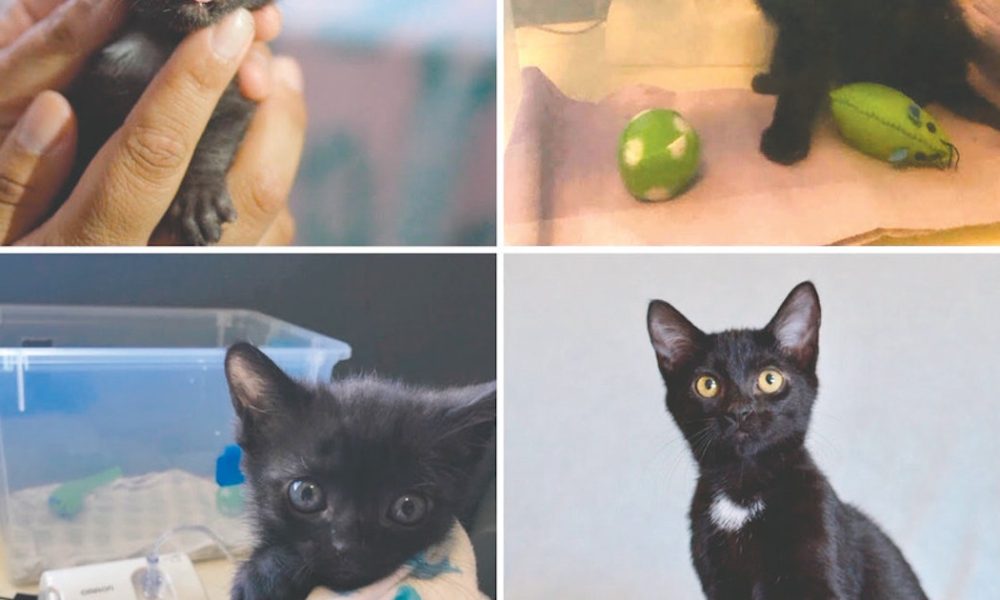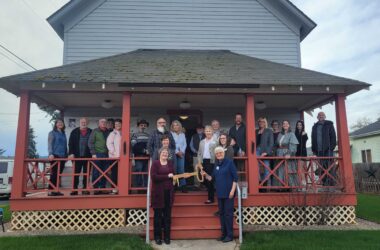 Forrest was rescued as a newborn from the streets with his mom and sister. After prolonged medical treatment, he recovered and was adopted out earlier this fall. Photos Provided
Forrest was rescued as a newborn from the streets with his mom and sister. After prolonged medical treatment, he recovered and was adopted out earlier this fall. Photos Provided
SPRINGFIELD – From rehoming a cat whose owner has died, or placing kittens after a cat gives birth outdoors, to helping a cat whose owners moved away without them, each month Cat Rescue and Adoption Network (CRAN) will receive around 35 requests for help.
CRAN is an all-volunteer organization with over 200 members that focuses on finding homes for cats and kittens with special needs. So far, in 2019 CRAN has taken in around 600 cats and kittens and have placed more than 450 in adoptive homes locally.
”Our mission is to care for and find loving, permanent homes for abandoned, neglected, sometimes abused cats and kittens in our community,” Louanne Koch, president of CRAN, said.
She added that although there is a humane society, Greenhill, in the community, their work with cats is based on contracts with the City of Eugene and Lane County. Greenhill does not have a contract with the City of Springfield and Springfield’s animal control isn’t set up to take in stray cats.
”A large portion of the requests for help that CRAN receives come from Springfield, (and) the other small towns and cities in Lane County,” Koch explained.
Key focus points for CRAN include: the necessity to spay and neuter to reduce pet overpopulation, the importance of adoption, the humane treatment of animals, and how to deal with feral cats through trap-neuter-return. The organization receives no government funding; all income comes from adoption fees, grants, donations and fundraising.
Originally, CRAN was called the West Coast Dog and Cat Rescue, focusing on both animals, starting in 2007; however, the volunteers for the dog rescue side moved on and because there were other dog rescue programs in the county, the focus shifted to helping only cats. Their name changed in 2017.
Koch started volunteering in March 2010 because fostering a couple of kittens sounded like fun. She ended up fostering three adult cats with upper respiratory infections (cat colds), and she ended up adopting one of them.
”From that first set of foster kitties, I was hooked,” she said.
When cats come into CRAN, they are provided with basic medical care – although if one is ill it will be treated by veterinarian partners in the community. Then they are placed in a foster home.
They have had cats in their care with anything from parasites to amputations.
”I recently fostered a cat, Gable, who was surrendered at a local vet with a badly infected, broken tail,” Koch said. ”He was facing possible amputation of his tail, right up near the base, but thanks to the kindness of the veterinarian providing us with his medical care, he went through a lengthy course of antibiotics to cure the infection, and he was recently adopted.”
Some kittens CRAN receives are only a day or two old; but, when they are over two months and two pounds they will be spayed or neutered, vaccinated and put out for adoption. They will even take elderly, infirm cats when their owners opt to surrender them, and treat them for ringworm.
”Our volunteers feed them, love them, medicate them with antifungal drugs and shampoos, cure them, and then they go through the adoption process to live long, happy lives,” Koch said.
One volunteer, Julie Tanit, said that two cats, Hazel and Elizabeth, each had three kittens in an orchard off Jasper Road in Springfield. CRAN took in the kittens and one mother-daughter pair; the last two cats of the eight were adopted together last week.
Another volunteer, Christina Drumm, was fostering Tato, who was rescued as a kitten four years ago. Tato was emotionally shut down from the trauma of living on the streets, as well as ringworm that required lengthy treatment.
”As her foster, it took me months to help her heal both emotionally and physically,” Drumm said. ”I became so attached to this beautiful girl that I couldn’t let her go and adopted her myself.”
Going forward, Koch said that CRAN is constantly striving to work smarter and continue to support the volunteers in their organization, as well as promote the spaying and neutering of pets and educating the public about how to trap, neuter and release feral cats.
”We can make a dent in the unfixed cat population, and prevent some of the cruelty that we see,” she said. ”We want to continue to provide service to our community, by caring for the cats and kittens of the community.”
FOSTERING CATS
• Volunteers look at kittens, weigh them, check for fleas and apply treatment, and assess how they look. Fosters are called and a temporary home is found; CRAN supplies food and litter.
• A foster’s job includes feeding and observing: How much are they eating? Are they all eating? Gaining weight? If a kitten isn’t, the feeding location is adjusted so that everyone is fed.
• Get to know the kittens and their personalities.
• After the two-month or three-pound mark, kittens are spayed/neutered, vaccinated and microchipped. Cats are then put up for adoption.
• For adult cats, or cats with special needs, medical treatment is provided and fosters then observe and get to know the cats’ personalities. This process takes anywhere from weeks to months.








